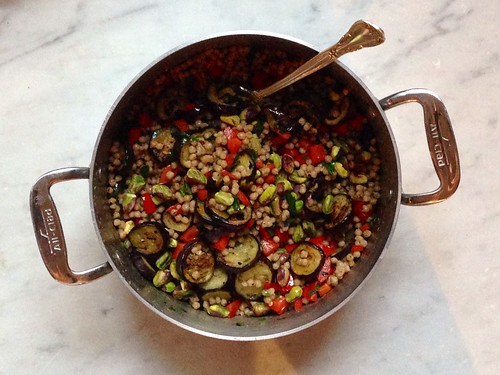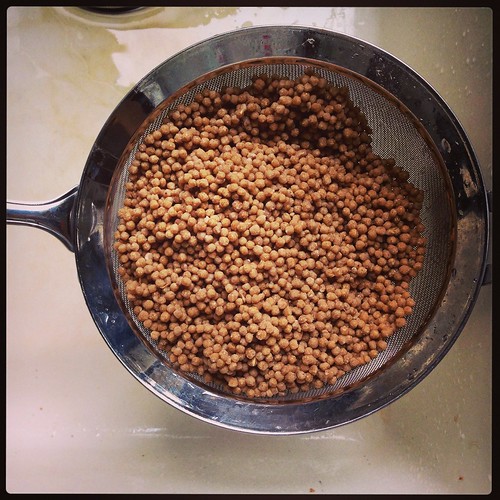
It's been a while since we did a reading list, and I feel like the internet has been particularly generous this week. Plus, last week I gave you all a two page typed recipe on a very esoteric bread you will probably never make, so it's time for something easy and fun!
-- If you're in New York before the end of September, check out the New Museum's contemporary art exhibit: Here and Elsewhere. Also check out this interview with Syrian-Armenian photographer Hrair Sarkissian.
-- This interview about Syrian traditional chants on Fresh Air made me all misty-eyed. Hearing the chants, I thought of the Syrian Orthodox church in Bab Touma where I celebrated my friend's girls' communion. Then I thought of the service driver who drove the regular route from Nazem Basha Street up to the heights of upper Muhajireen to my apartment, his Sufi chants always playing, the Allah symbol swinging from the rear view mirror. I thought of delicious meals at Beit Sissi, which is probably 90% of the reason why I write this blog at all, and which has been destroyed.
-- Following my wave of nostalgia, but on a more upbeat note, I watched an old episode of Ba'qa Diwa (a Syrian parody called Spotlight, only in Arabic) for a good laugh.
-- If that esoteric mhajeb recipe last week was up your alley (insert Arabic cooking nerds fist pump!), then you should really be following Cuisine et Traditions Culinaire Algerienne on Facebook. The posts are in English and French, and it is one of the best places to learn about unique Algerian cuisine beyond your standard couscous.
-- This old article on Philippe Petit is on my to-read list.
-- I loved Joumana's post on the book Akkar to 'Amel so much that I ordered myself a copy (fist pump again!).
-- George Packer's articles on what's happening in Iraq have been great, especially this one. Also this piece from Vox news.
-- This article on Buenos Aires is just so good. Only Argentine's would make a pizza with meat as the crust.
-- On the playlist this week: Fasateen and Herzan, via Lebanon, and an old Jaza'iri favorite Wilkoum y a Kawm.

Barley Salad with Eggplant, Peppers, and Herbs
I made this with a type of pearl couscous from Algeria that is made with barley flour, called berkoukes sha'ir (بركوكس شعير). Given that you can't get this in the U.S. I recommend you either use regular pearl couscous (sold as moghrabiya, maftoul, or Israeli couscous in most groceries), or you could adapt this into a grain salad and use rye or wheat berries, or pearl barley, which more closely approximated the chewy earthy texture of the berkoukes.
2 cups pearl couscous, or rye or wheat berries, or pearl barley
2 Japanese eggplants, sliced and the slices sprinkled with salt
1 large red bell pepper, diced
1 large handful each parsley and cilantro leaves
3 scallions
1 lemon
1/4 cup pistachios
olive oil, salt
1/4 teaspoon Urfa Biber pepper (or Aleppo pepper)
1. Cook the couscous or rye berries in boiling salted water according to package directions. Drain and immediately toss with a generous amount of olive oil and a generous amount of salt to prevent from sticking.
2. Slice the scallions on the bias. Take the white parts of the scallions, place them in a small bowl, and squeeze the juice of the lemon over them. Let rest while you do the next steps.
3. Heat some olive oil in a skillet. Add the sliced eggplant and cook until nicely browned on both sides and softened in the middle.
4. When the eggplants are done, scrape them into the pot with the couscous, add a bit more oil to the pan, and this time saute your red pepper until softened and blackened in spots.
5. Add the red pepper to the pot with the couscous, and add the pistachios to the pan. Let the pistachios toast for a minute or two, then add them to the couscous.
6. Loosely chop your herbs and add them to the couscous with the green parts of the scallions, and the white part of the scallions and their lemon juice. Add the Urfa Biber pepper and stir everything together. Taste for seasoning and serve.






1 comment:
The destruction of Beit Sissi breaks my heart. I had many amazing meals there, none better than the kebeb bi kirz. Looking forward to trying this recipe!
Post a Comment